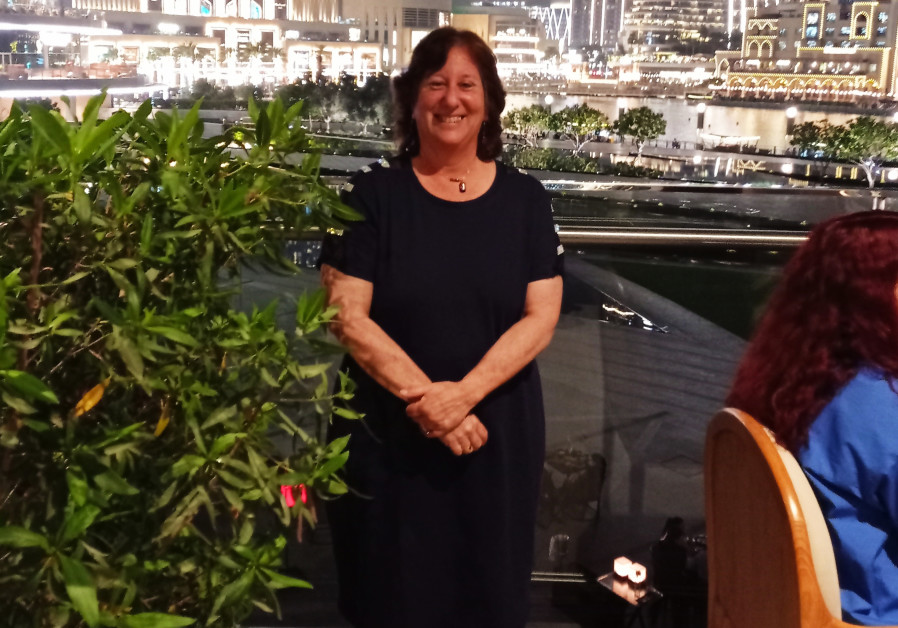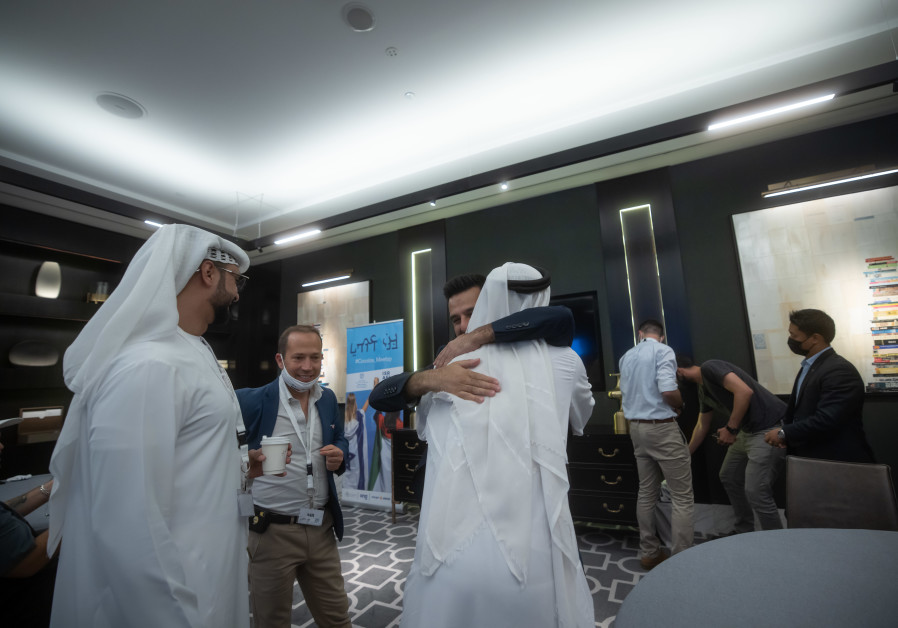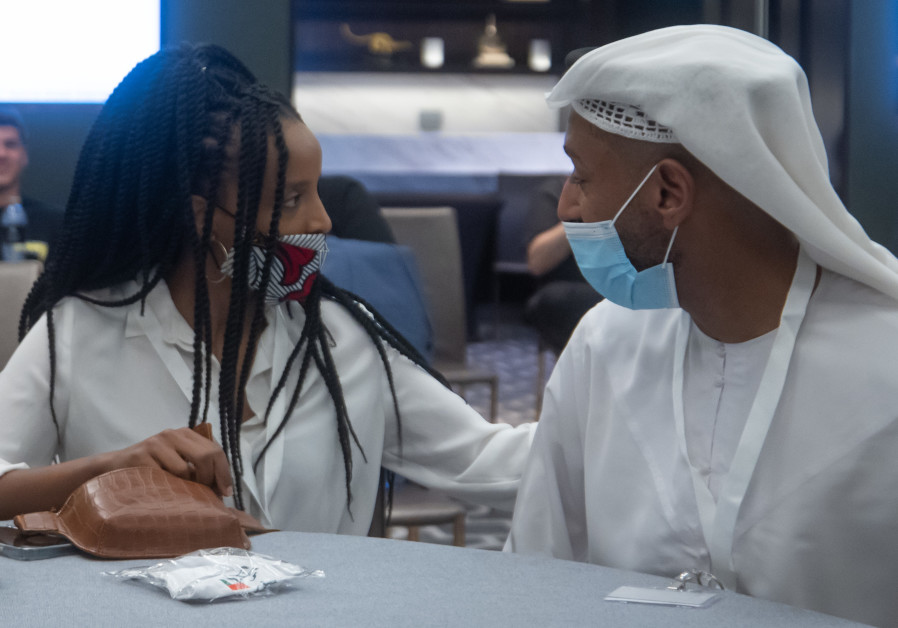Then in late January, Israel closed its skies, hoping to keep COVID-19 variants out of Israel, and the tourists stopped coming. Now with most adult Israelis vaccinated, tourism is picking up again. Israel has announced it will reopen for tour groups in late May, assuming all participants are vaccinated, and hopes that tourists from the Emirates will come to visit Israel as well.
“We have spent a lot of time since the good news (the Abraham Accords) learning about Israeli culture and Jewish culture,” he said. “I have written a playbook for the staff with input from the Hilton General Manager in Tel Aviv about Shabbat and the holidays.”

“What’s that holiday again where you eat the donuts?” he asked, referring to Hanukkah, when Jewish Israelis eat fried donuts rather than latkes as American Jews do. “We missed that one this year, but we’ll get it next year.”
There are currently two kosher restaurants in Dubai – the Kaf/Armani, a high-end restaurant in the Burj Khalifa, the tallest building in the world, and a casual Israeli-style restaurant called Mul Hayam. There is also a kosher caterer called Elli’s Kosher Kitchen.
Dubai has a vibrant food scene, and for tourists who are not Orthodox, many restaurants have vegetarian options. At Maine, an upscale restaurant in the futuristic Me hotel, owner Joey Ghazal said they had inaugurated a plant-based section of the menu which is cooked separately from the meat. The crispy brussel sprouts were one of the best vegetables I’ve ever eaten.
“We are trying to bring a little East Coast romanticism to Dubai,” Ghazal said in an interview over lunch at the restaurant. “Three-quarters of our vegetables are sourced locally.”
He said there are over 10,000 restaurants in Dubai, including three branches of Maine. He hopes to open a branch in England soon.
For Israelis, there is the stunning architecture of Dubai, with its futuristic feel. There are the gigantic malls, including the Mall of the Emirates, which even has an indoor ski resort. There are desert “safaris” where you can drive ATVs over the sand dunes. And there are the Emiratis themselves, who all speak fluent English, and who have lived all over the world.
All over Dubai, Emiratis seemed genuinely interested in Judaism and Israel. On the advice of a friend, I brought small bags of Bamba, handing them out to new Emirati friends and shopkeepers.
“I’ve always wanted to try this,” Emtiyaz al Sharabi, a British-born woman who has lived in the UAE for the past six years, told excitedly. “I’m learning Hebrew too. Ma nishma? (How are things?)”
I was recently part of a delegation sponsored by Israel-is, an organization founded in 2017 by former Israeli combat soldiers, that aims to improve Israel’s image abroad. The delegation brought young Israeli social media influencers to Dubai for four days in April to meet their Emirati counterparts.
“We came here with the top social media influencers including singers, chefs, and rappers,” said Eyal Biram, the CEO and founder of Israel-is. “These are people who build perceptions and that young people follow. They will build their perception about Israel and the UAE from the things happening here.”
The slogan for the conference was “Cousins Meetup” and there was a logo that cleverly combined both Hebrew and Arabic. The “cousins” description was partly ironic, as it’s a way that some Israeli Jews refer to Palestinians in both Israel and the West Bank in a derogatory fashion. The Emirati hosts repeatedly told Israelis that Dubai was their “second home” and they should feel as comfortable as they do at home.
Among the Israelis was Stephane Lagar, an African singer and rapper, who is well-known in Israel. Israeli tourists in Dubai kept stopping him on the street for photos.
“Peace between Israel and the Emirates is something crazy,” he said. “We came here so the ordinary people, not just leaders, will meet each other, create connections, make new friends. He describes his place, I tell him about Israel.”
Biram said it’s exactly these types of encounters that he likes to see. “Lua al-Sharif, a Saudi influencer, was sitting with Stephane, one of the top Israeli singers,” he said. “Together they learn about each other, and together they make a story on Instagram. And this story got publicity around the world. I’m sure that every Arab in the entire world, from Saudi Arabia, Bahrain, the UAE, will have more tolerance for the other side.”
Rotem Sharon of Israel-is, who organized the summit in Dubai, said Cousins Meetup is part of the Leaders of Tomorrow Project.

Like young people everywhere, the delegates on both sides documented almost every minute of the trip. Emtiyaz al Sharabi posted a photo of her waving a small Israeli flag next to one of the Israeli delegates waving an Emirati flag. The TikTok story had 50,000 views in hours, along with dozens of hate messages from around the Arab world, and even a few death threats.
“I’m getting a lot of hate but I simply do not care as I am firm in what I believe in,” she wrote me in a WhatsApp message. “I still pray and believe in peace in the Middle East.”
The trip was a chance for Israelis and Emiratis to meet each other. For many of them, it was their first real encounter with the other side.
“I think that being an activist for Israel and being here in Dubai so soon after the Abraham Accords can definitely have an effect on how people view Israel and Israelis,” said Hallel Silverman, one of the Israeli participants. “One of my favorite questions for the participants is ‘What are the biggest lies that you once believed about Israel?’ I want to know about how you got into this world, about what you used to believe, how you broke out of it, why you’re here, why you want to be our friends.”
The normalization with Israel is backed by the Emirati government.
Saeed Al Nazari, the director-general of the Federal Youth Authority of the UAE, joined a youth circle where young people on both sides spoke of how to make the Abraham Accords more tangible.
“These meetings are a translation of what peace is meant to be and what peace can bring to the table,” Al Nazari told The Jerusalem Report. “We saw that in the youth circle that gathered young Emiratis and young Israelis, we have lots of areas to explore and lots of areas to work on. We have a great vision, and we want to turn it into something tangible.”

“All my perspective about Islam, about Arab countries, our relationship and how we as people can work together, have changed and evolved,” said Ashager Araro, co-founder of Beta, the Ethiopian-Israeli heritage center. “We created an actual connection, an actual friendship that I’m sure is going to last.”
One of the Israeli participants was Yoseph Haddad, a Christian Palestinian citizen of Israel who served in the Golani Brigade and was wounded while fighting. He said the language and culture in Dubai are familiar to him.
“We’re seeing that one minute after we meet, all the barriers disappear,” Haddad said in an interview. “How does the hashtag say ‘Cousins Meetup’? So cousins meet up and for me it’s a little bit like Brothers Meetup so it’s quite unique and nice.”
Also unique was the first commemoration of Yom HaShoah, Israel’s Holocaust Memorial Day, in Dubai. There were two ceremonies – one with the influencers and one with the Jewish community in Dubai, which is expanding quickly.
Rabbi Dr. Elie Abadie, the senior rabbi of the Jewish community of the Emirates, chanted an Arabic translation of the “El Malei Rahamim” prayer. As he chanted, the mosque next door began the Muslim call to prayer.
It seemed a fitting example of the new close ties between Israel and the UAE.
The writer was a guest of Israel-is.
